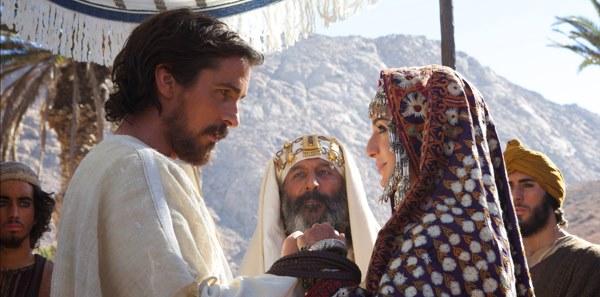

As the title suggests, this film purports to retell the story of the deliverance of the people of Israel out of slavery in Egypt, sometime in the second millennium before Christ. It centres upon a self-reliant, religiously sceptical, patriot-turned-guerilla-insurgent Moses, which for most viewers will already be a rather bold interpretation of the source material. As the saga unfolds, it feels progressively less like the ancient story than something springing anew from the imagination of director Ridley Scott, who, perhaps remembering the box office glories of Gladiator, seems intent on transforming it into the next great pagan epic.
Christian Bale plays Moses, the one man in the represented ancient world, it seems, who has no time for religion. His positive philosophy flashes out momentarily when his wife Zipporah (María Valverde) confronts him about religiously confusing their son, to which he retorts: what’s wrong with teaching him to believe in himself? This from the man whom the Book of Numbers describes as ‘humble, more so than anyone else on the face of the earth.’
Such unreflective self-assurance is about as deep as the film takes us, alas. There is no indication that the irony is intentional when, a few scenes later, Rameses (Joel Edgerton) declares himself a god and effectively espouses the same view. He is obviously meant to be the tanned, hairless, mascara-ed antitype to a rugged, man’s man Moses, but the differences are only skin deep.
The film is similarly dense or tone deaf (it is not easy to say which) when it comes to the traditional spiritual significance of its source material. The plagues against the Egyptians are depicted primarily as naturalistic events – the Nile turns to blood, for example, after some massive crocodiles tear into one another – but there is a subtly condescending feeling that religiously-minded folk might still believe what they wish. A similar kind of soda-gone-flat sensation accompanies the crossing of the Red Sea: somebody points out that the tide has shifted, and that’s about as much as anyone says. What is possibly the most sublime moment in the Hebrew Bible, when God reveals his name – which, as an essential descriptor of the originary source of all things can only be understood in its own terms: ‘I am who I am’ – is related from the lips of a sulky child whom Moses only encounters after a head injury. If there is something really marvellous going on here, it is an uncanny ability to inspire yawns in the presence of the impossible.
One feels inclined to insist that the story of Israel’s deliverance is not a story that has been retold for over 3,000 years because it illustrates the virtues of agnostic self-possession, the need for contemporary social renewal or some bizarre concatenation of one-time biological events. It is a story that lives because it is essentially a story of salvation. As God rescued his people from physical bondage in Egypt, so he continues to rescue people from another kind of bondage, from all those habits and associations of self-destruction known collectively as ‘sin’. When salvation is no longer a part of the story, one suspects that it will be forgotten just as quickly as this film surely will.
Exodus: Gods and Kings attempts to make its story relevant for the present moment by marginalising the only thing that makes it really interesting: God. There are better social commentaries available; and if CGI images are all one is after, this is arguably done only as well, after its fashion, as that classic of contemporary animation, Prince of Egypt. For anyone looking for a more fitting retelling of this salvation history episode, this latter, in its reverence, wonder and humour, comes highly recommended. It boasts some great music, moreover, and unlike this recent release, never even comes close to lullaby.
(Originally published in Thinking Faith)
